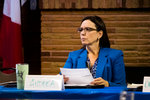

Ask anyone who lives within reach of the high-water mark in the Chehalis River Basin and they will tell you that progress in the fight against flooding has long been slow to materialize.
Many area residents have more than once seen flood waters recede, giving way to a new workgroup which discusses problems ad nauseum to no substantial effect. Then another flood comes along and the process begins again, spawning nothing but destruction and a bevy of new well-meaning but similarly inconsequential coalitions along the way.
The Office of the Chehalis Basin is the latest incarnation in that effort to push back the wake of the next inevitable flood, and it too has been stymied in its initial efforts. The office was legislated into existence in 2016 but then failed to receive any funding due to political squabbles that prevented a state capital budget from being passed for 2017.
But with the first round of state funding finally in place, the Office of the Chehalis Basin now has a new director who appears ready to push forward against more than 100 years of inertia.
Andrea McNamara Doyle recently took over as director of the Office of the Chehalis Basin and is well aware that the sternwheel of change has been slow to churn on the state’s second-largest watershed.
Her first public meeting with the majority of office members, and the associated board, took place Thursday in Chehalis. There, McNamara Doyle expressed her desire to make haste to bring meaningful flood mitigation measures to fruition for the entirety of the basin.
“I think that it’s at a really critical time in the effort. Yes it’s been around for 100 years but the next few years are really going to be essential for making sure that the long-term future is really where we want to go,” said McNamara Doyle. “What attracted me to this is the desire of the community to create a holistic, integrated approach to these very persistent and difficult problems.”
McNamara Doyle comes to her new position after most recently serving as the director of a statewide nonprofit organization known as the Washington Wildlife and Recreation Commission. She has also served on the state Shoreline Hearings Board and the Pollution Control Hearings Board, where she worked closely with the department of ecology after being appointed by Governor Gregoire. She has also worked as a private lawyer representing the interests of Chelan Public Utilities and Avista Energy in relation to their hydroelectric dams on the east side of Washington.
McNamara Doyle was appointed by Department of Ecology director Maia Bellon, who was present on Thursday at the V.R. Lee Community Building in Chehalis in order to make introductions to a throng of OCB members, state representatives, and interested community members. Bellon said that she believes McNamara Doyle’s diverse background will serve her well in a position that requires cooperation with countless government and private entities and a comprehensive understanding of the law.
“She’s got chops in the legal capacity. She’s got chops in the legislative capacity. She works hard and has got great management skills, and we need all of that here,” said Bellon. “She knows how to put her head down and work really hard and she also knows how to use particular strengths of a board and how to put them in the right place at the right time.”
Bellon explained that the Office of the Chehalis Basin would have been able to dive into its extensive workload much earlier if the state capital budget would have come through last year.
“I am sorry that the legislature wasn’t able to provide a capital budget for 2017 or I would have appointed a director of the OCB a year earlier,” said Bellon. “I am glad to bring Andrea on the team. She is essentially my delegate. She is my eyes and ears on this project.”
Although she is new to her position, McNamara Doyle is not new to the area and she says she understands that people in the Chehalis Basin are thirsty for preventative and mitigating flood action from the mouth of Grays Harbor up to the headwaters beyond Pe Ell.
“I’ve lived in southern Thurston County for a long time, so I’ve spent a fair bit of time in the basin and I’ve come to really appreciate this basin as a neighbor and so the opportunity to bring my background and experience to such an important challenge was really appealing to me,” she said.
After about five weeks on the job, McNamara Doyle says she knows she has an enormous amount of work to do, but she’s happy with the inroads she’s been able to make into the community so far. She noted that she recently attended a landowner meeting in Boistfort and she will soon be headed to Pe Ell to check out the proposed water retention dam site. She has also been making an effort to meet with as many of the various Chehalis Basin work groups that have popped up over the years as possible in order to get everyone paddling in the same direction moving forward.
“One of the challenges that we face is the scale of this effort does require a concerted effort by everybody who’s involved in it to keep one another informed and keep the public informed,” said McNamara Doyle.
In her very first director’s report on Thursday she added, “One of the questions I have is looking at the landscape and all of the roots organizations that are involved, you know, how territorial are all of these organizations? How protective are they of their little slice of the pie and how willing are they to collaborate?”
In that oral report McNamara Doyle insisted that the Chehalis River Basin Flood Authority will continue to play an integral role in the long term management of the river system in the years to come, and noted that three members of the Flood Authority are also members of the OCB.
“The flood authority will continue to have, I would say, primary authority over selection of local projects,” said McNamara Doyle.
McNamara Doyle said she was pleased with the turnout of state legislatures at Thursday’s meeting and lauded the bipartisan support that Chehalis River flood mitigation has received thus far at the Capitol.
“I think our legislators from the basin have done a remarkable job of keeping the urgency and the importance of the issue on the radar of the legislature, along with the rest of the state who also think their issues are important,” she said. “I would just say that I know the longer we get away from the ‘07 flood the harder it is to keep the sense of urgency around it, but we’re on borrowed time. I know that, and everybody who lived through (the 2007 flood) knows that. We’ve just got to keep this thing moving forward.”